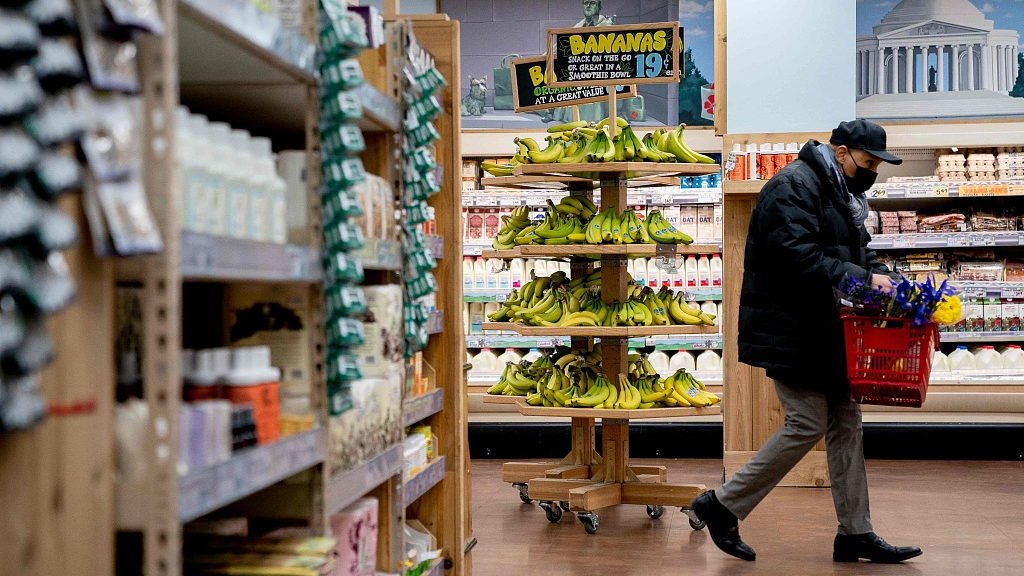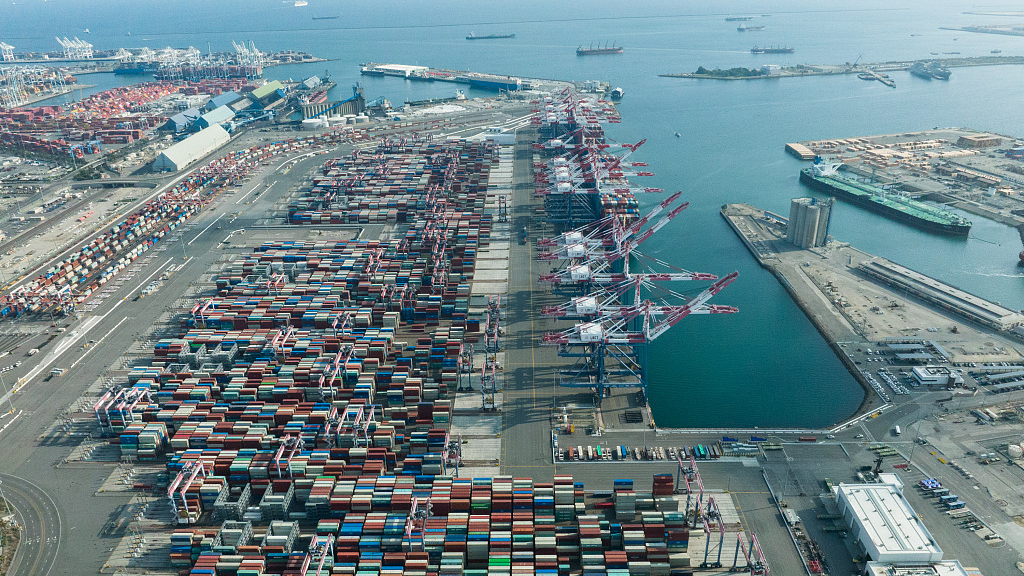
A grocery store in Washington, D.C., U.S., March 13, 2022. /VCG
A grocery store in Washington, D.C., U.S., March 13, 2022. /VCG
Editor's note: Bradley Blankenship is a Prague-based American journalist, political analyst and freelance reporter. The article reflects the author's opinions and not necessarily the views of CGTN.
The U.S. Bureau of Labor Statistics' Consumer Price Index (CPI) report for March is in and the results are, as predicted, terrible. Year on year, inflation in the U.S. rose by 8.5 percent, the fastest rise since December 1981. The biggest culprits are basic necessities like food, shelter and fuel.
Consumers are being so ravaged by inflation that the White House braced the media and public for the report the day before it was published. Speaking to the press, White House Press Secretary Jen Psaki made sure to use the administration's catchphrase, "Putin's price hike," when discussing the issue.
However, in our world, the one where the laws of causality apply, Psaki's characterization of this inflation makes no sense. If anything, the administration of President Joe Biden is consistently enacting policies that will exacerbate inflation.
To be sure, the ongoing COVID-19 pandemic that has claimed nearly 1 million American lives and debilitated many more – as some researchers suggest, probably a significant amount of the labor pool – has impacted the supply chain. There are also disruptions from the deleterious effects of climate change.
But major issues driving inflation that are directly attributable to the administration and U.S. government policy, in general, are unilateral sanctions and trade protectionism.
Take food as an example. According to the UN, Russia is the world's top exporter of nitrogen fertilizer and second in phosphorus and potassium fertilizers. Russia's "special military operation" in Ukraine has hampered the global food supply by driving up the cost of fertilizer, plus agricultural exports from both Russia and Ukraine, two of the world's top exporters of various products, but so have sanctions and tariffs.

The Port of Los Angeles in California, U.S., April 3, 2022. /VCG
The Port of Los Angeles in California, U.S., April 3, 2022. /VCG
Prior to the "special military operation," the CPI had already been steadily rising to an intolerable degree. Tariffs on U.S. imports of phosphate fertilizers from places like Russia and Morocco, two leading producers, were already raising costs and, in effect, cutting off small U.S. farmers from the global market because of production cost hikes.
Likewise, AFP noted in January that European Union and U.S. sanctions on Belarus, a major exporter of potash, which is a key ingredient in mineral fertilizers, was another factor in surging global food prices.
All of these policies are supposedly aimed at helping American farmers by eliminating foreign competition, i.e., the working class, and helping to promote democracy – but they are really just entrenching the same monopolies that are hiking prices.
For example, according to the White House's own economic advisers, the country's four biggest meat-processing companies used their collective leverage to hike meat prices and boost their profits by 300 percent while also underpaying farmers. The White House is supposedly looking into ways to promote competition – but it's unlikely the administration could have an effect without a spending bill from the country's deadlocked Congress.
So far, the solution by the Department of Agriculture to cut food costs for consumers is to subsidize fertilizer production to the tune of $250 million, meaning, most likely, corporate cartels will get free taxpayer money to continue price gouging.
Speaking of Congress, we can also see a remarkable lack of political will in actually addressing supply chain and consumer issues in that branch of government.
Both chambers passed their versions of the COMPETES Act of 2022, which is really just a bill aimed at intensifying the new cold war against China. Now they are ironing out slight differences in conference before heading to Biden's desk for signature.
The bill will supposedly boost America's domestic semiconductor industry and boost competitiveness with China, but will undoubtedly only stoke more inflation and more trade wars. As the Cato Institute discussed in a piece in December 2021, the global semiconductor industry was already set to rebound midway through this year and its cyclical nature means taxpayer subsidies would set up a future overcapacity – meaning, most likely, trade wars against competitors.
The bill would also expand "trade remedies" used by the U.S. against China for alleged unfair trade practices. However, this itself violates the U.S. obligations to the World Trade Organization (WTO) and, recently this January, the body issued a decision allowing China to impose duties on $645 million worth of U.S. imports over U.S. trade malpractice.
This bill would actually hurt U.S. companies' competitiveness in China, the country which will be the largest consumer market in the world within a generation.
U.S. trade protectionism at every level of government continually shows a remarkable lack of ability to plan for the long-term. Sanctions and trade protectionism, which may gain short-term political gain, are only hurting Americans in the long term. The March CPI report is a case in point of how aggressive American foreign policy hurts the average Americans' wallet.
(If you want to contribute and have specific expertise, please contact us at opinions@cgtn.com. Follow @thouse_opinions on Twitter to discover the latest commentaries on CGTN Opinion Section.)

